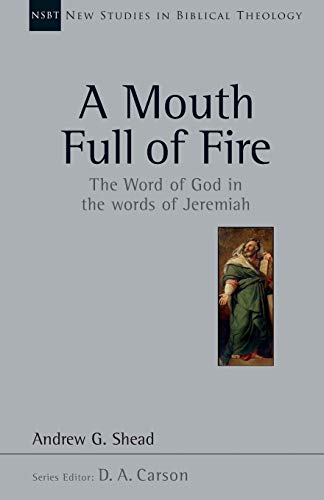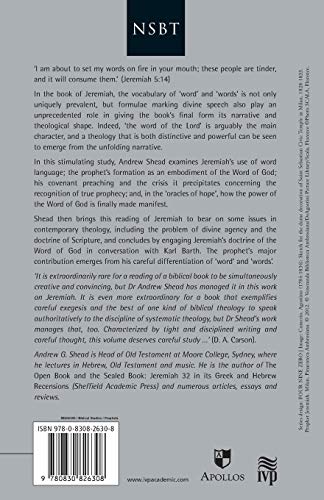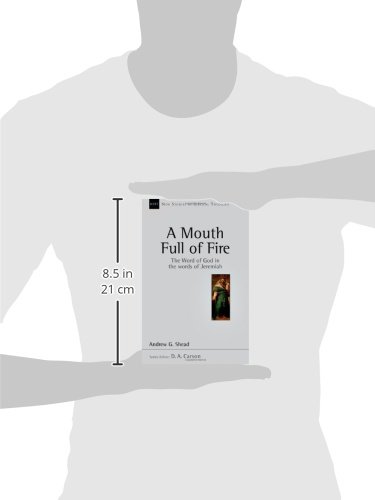Customer Services
Copyright © 2025 Desertcart Holdings Limited




A Mouth Full of Fire: The Word of God in the Words of Jeremiah (Volume 29) (New Studies in Biblical Theology)
J**N
Great commentary on the book Jeremiah.
I was doing a research paper on Jeremiah for school and professor recommended this book and I loved it. I had never read Jeremiah with the idea that the WORD of God was the major theme of the book and it has opened up the book to me in a different way than just the destruction of Jerusalem. Jeremiah was one tough prophet and kept preaching the Word of God regardless of what they did to him. Look forward to other books by this author.
R**R
Five Stars
This was an exceptionally well written and captivating book.
M**E
Great book for the right audience
I thought about preaching through Jeremiah once. Then I tried to outline it. I decided I would postpone that Jeremiah series for a time when it made a little more sense. After reading A Mouth Full of Fire: The Word of God in the words of Jeremiah, I might be a little closer to a Jeremiah series.Andrew Shead attempts to unify the book of Jeremiah around the central theme of "the word of the Lord". Shead believes that it is best described as "the story of what happened when the word of the Lord came to Jeremiah". And as we listen to this story it helps us shape our own doctrine of the word of God. This book, then, serves as both a discussion on Jeremiah and a discussion on the doctrine of the word of God.The book begins with an attempt to defend his thesis and outline the suitability of Jeremiah to give us a solid theology of the word of God. He then goes about structuring Jeremiah. After engaging in these introductory matters, Shead, then shows how his argument bears on our doctrine of the Word. He looks at the Word and speaker, Word and hearers, Word and power, and finally the Word and permanence. He closes the book with a "conversation" with Karl Barth.My TakeI got a great deal out of this book. It helped me to think through Jeremiah and read it more cogently. Furthermore, Shead does a great job of defending his thesis. I'm convinced that he is correct in his theme of Jeremiah. If I ever do preach through Jeremiah I will be sure to go back to Shead and structure the book accordingly.What is most helpful in this book, in my opinion, is the distinction that is made between "word" and "words". His chapter on The Word and Speaker was very beneficial to me. I write and speak the Word frequently. His statement that, "a prophet is made by God into a word-shaped person" hauntingly shows that you really cannot separate the messenger from the message.Should You Buy It?The book will not be for everyone. It is written in the middle of a scholarly discussion on the nature of the word of God. If you aren't already introduced into that conversation it might be a little difficult to get brought up to speed. However, the book is not so pedantic that a casual reader couldn't pick it up and benefit.Those most likely to benefit from this book would be someone that is studying the doctrine of the word of God. This needs to be part of that study. Furthermore, someone attempting to study or preach through Jeremiah would benefit greatly by giving this book at least a perusal. Shead helps outline Jeremiah in a way that I haven't really seen before. It is profoundly helpful if given to the right audience.
S**S
Studying Jeremiah? Read Shead.
You can find my review here: http://wp [.] me/p3JhRp-cqhttp://spoiledmilks [.] wordpress [.] com/2014/05/30/review-a-mouth-full-of-fire/"I am putting my words as a fire in your mouth; these people are tinder and it will consume them." (Jeremiah 5:14)Shead argues that in the book of Jeremiah, the vocabulary of "word" and "words" is a literary and theological blueprint to give the book's final form its narrative and theological shape. It is not Jeremiah, but the phrase "the word of the Lord", who is the main character in the book of Jeremiah. Shead's Structure offers a great outline of Jeremiah (this is seen in ch 2 'Structuring Jeremiah', but is relayed in the following chapters 3-6).The NSBT series believes there is an inner unity to the Old and New Testaments and works to synthesize the whole-Bible's teaching on the God we worship. "Biblical theology…may be defined as knowledge of God as God in the Bible" (pg. 28). The Bible is one which reveals God in such a way that we may in fact know Him, His character, and His Son, the Word.(+) Shead's exegesis is excellent. Shead's outline and structure of Jeremiah gives way to pages and pages of note-taking (hopefully in your Bible too!). He provides us with a movie director's perspective, and how the camera draws into Jeremiah's character, and out to show him as an incidental character caught up with the rest of Judah in the destructive power of the Word of God. This was the best part of the book (in my opinion).(-) While exegesis was gold and alluring, theological discussions were bewildering. Considering this is a book from a pretty academic series, I can't come down hard on Shead. It's not his fault I'm not smart enough to understand. But whether talking about ‘speech’ in the divine agency debate, Goldingay's 'model of scripture' as inspired word, or the difference between prophetic speech and a prophetic book (to name a few), I didn't always know if Shead agreed with an opposing position or not. And whether or not he did, I didn't know why it mattered in the end.(-) The section on Barth was interesting, but still confusing. If you've read Barth, or have some knowledge on 'word' theology, this will make more sense to you. While there was gold to be found, I had trouble with the overall idea flowing through and the concepts discussed. Thankfully, Shead doesn't present Barth as the enemy.If you're studying Jeremiah and you want a bigger picture of Jeremiah, his structure, and his portrayal of the power and place of God's word, read Shead. [Many thanks to IVP UK for providing a review copy of this book. I was not required to provide a positive review in exchange for this book].
Trustpilot
3 weeks ago
1 week ago